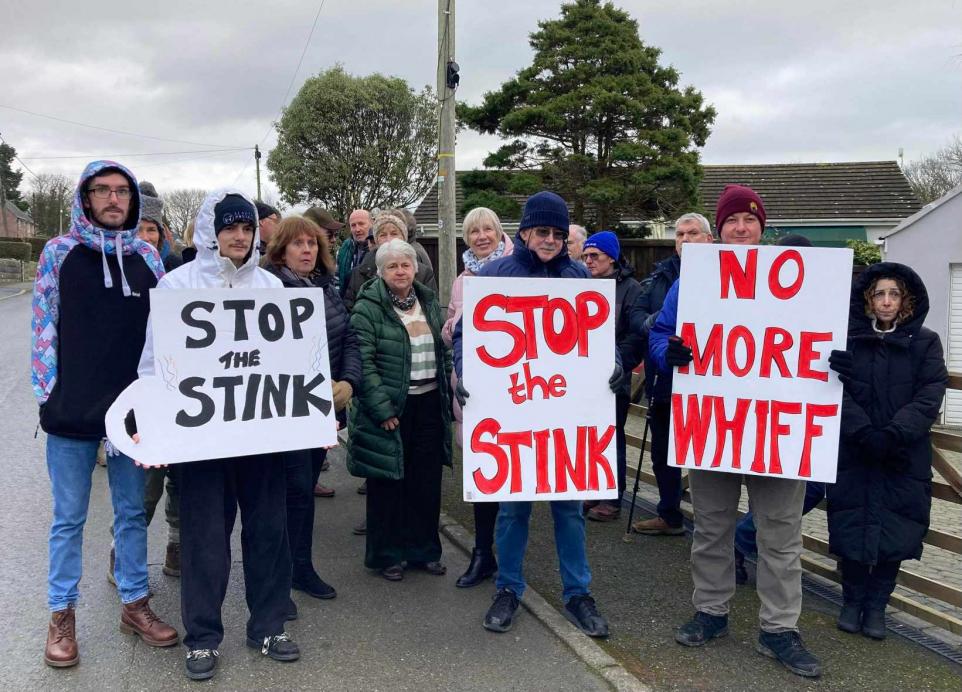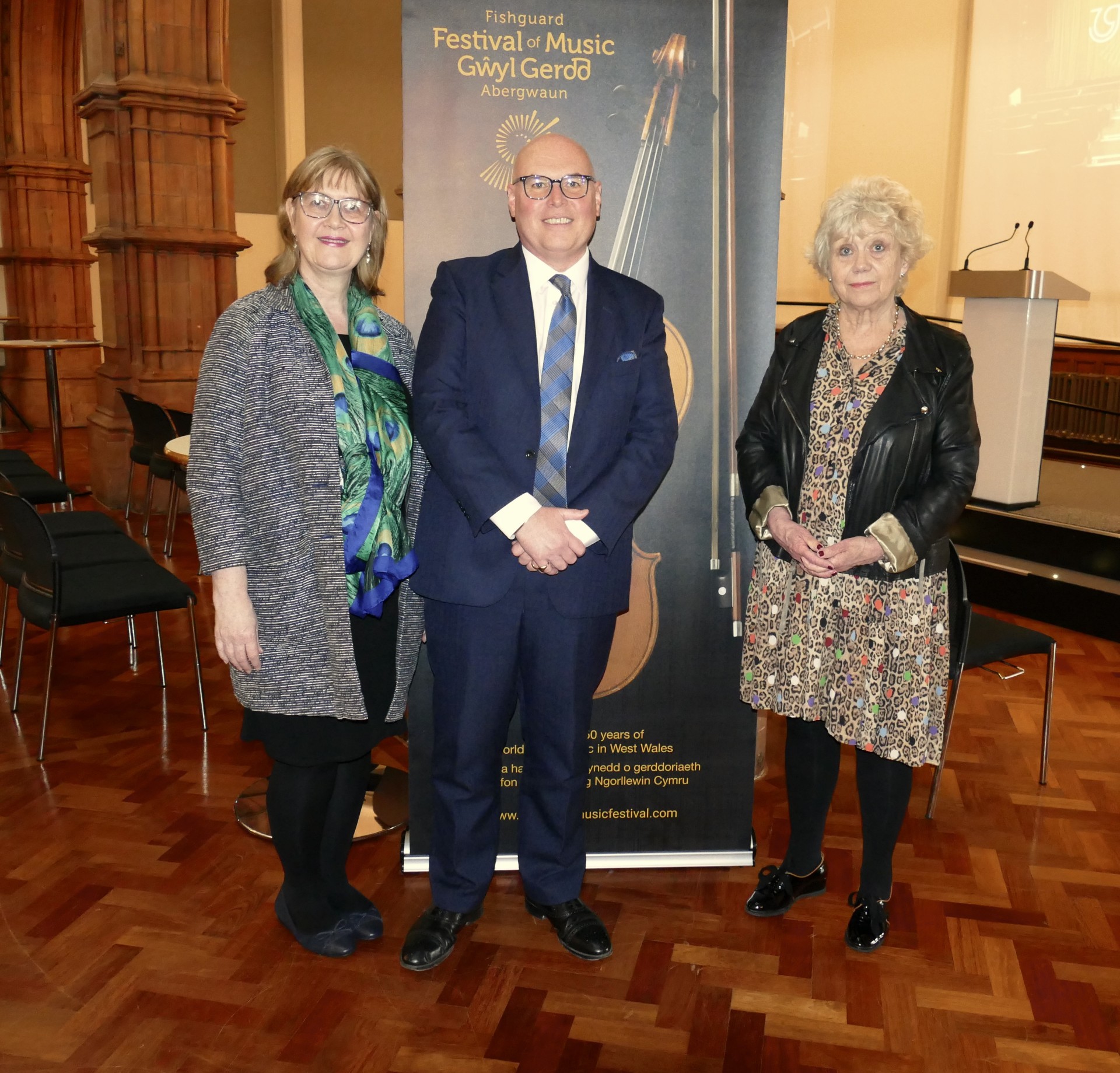News
Controversy over scallop dredgers
 A PETITION aiming to stop scallop dredging grounds from being extended in Cardigan Bay has received over 15,000 signatures, following criticism of a Welsh Government consultation. However, fishermen who have seen a lucrative ground closed for what will be at least seven years have claimed that extensive scientific studies carried out on the grounds since 2010 indicate that there is room for a sustainable fishery. The SAC (Special Area of Conservation) in Cardigan Bay is a traditional scallop fishery, which was closed in 2009 following concerns about the environmental impact of an influx of boats.
A PETITION aiming to stop scallop dredging grounds from being extended in Cardigan Bay has received over 15,000 signatures, following criticism of a Welsh Government consultation. However, fishermen who have seen a lucrative ground closed for what will be at least seven years have claimed that extensive scientific studies carried out on the grounds since 2010 indicate that there is room for a sustainable fishery. The SAC (Special Area of Conservation) in Cardigan Bay is a traditional scallop fishery, which was closed in 2009 following concerns about the environmental impact of an influx of boats.
A small area of Cardigan Bay – The ‘Kaiser Box’ is opened for fishing during the scallop season (Nov – Apr). This has been overfished, to the extent where some local boats are fishing alternative locations or for different catches. It is also claimed, both anecdotally and by scientists involved with the ‘test fishing’ that scallop stocks outside of the Kaiser Box are thriving to the extent where they are potentially unable to reach full growth and are leading to a reduction in biodiversity. The Welsh Government proposes to introduce a ‘managed fishery’ where areas of Cardigan Bay between three and 12 miles out to sea would be fished, with limits imposed on the number of times per season that each patch is dredged, restrictions on equipment used, and flexible restrictions based on the results of regular monitoring. A consultation was launched in November, but relaunched following criticism of the clarity of an online version, and a technical error. This area of Cardigan Bay was said by the Welsh Government to be mostly shallow water where the sand sea-bed was susceptible to ‘wave shaping’.
Test fishing carried out by scientists from Bangor University among others showed that, in the words of the Welsh Government report: ‘This experiment concluded that, as scallop intensity increased, the negative effects on the animal community also increased such that the abundance (i.e. number) and biomass (i.e. weight) of organisms per unit area of the seabed declined. ‘However, these effects were relatively minor and short – lived and were reversed in the period between May and September in the same year (note this would also coincide with the closed season for some scallop fisheries).
‘Depending on the sediment type, the abundance and biomass of benthic species (particularly the prey for fish) had increased in areas with the highest scallop dredging intensity. This may have occurred due to the removal of scallops which constitute the dominant fauna (in biomass) within the areas studied – i.e. through the removal of the main competitor for food. ‘Thus the effects of scallop dredging on prey species for fish do not appear to be a cause for concern. For most areas of the seabed, the physical effects of scallop dredging were no longer present 12 months later. There were two exceptions to this – one more cobbly area of seabed close to the 3 nautical mile zone that had been fished with an intensity of between 3 and 4 times fished, and one area in the 6-12 nautical mile zone that had been fished slightly more than 6 times (these figures are derived from averaging the fishing intensity across the experimental fishing area). Now that the location of these areas has been identified, the Welsh Government will be in a position to protect them by way of spatial restrictions’.
However, environmental writer George Monbiot rubbished these claims. In an ‘emotive’ article, entitled The Dolphin Killers of Cardigan Bay, which appeared in the Guardian last month as an opinion piece, Mr Monbiot made the claim that because the sea beds in Cardigan Bay had been dredged and trawled for years, they were likely to take ‘decades if not centuries’ to recover their former biodiversity, and as such, the Bangor University Study was flawed. One scientist was quoted as suggesting that if you failed to mow your lawn for five years, you would not end up with a first-growth oak forest. While this is true, it does seem to be a somewhat trite statement in this context. Mr Monbiot made some very valid points.
The effects of beam trawling and dredging on certain sea beds, especially coral and reefs, is devastating, and these are widely regarded as two of the more destructive forms of fishing in terms of environmental impact. However, claims about the damage to cuter varieties of marine fauna were not sufficiently explained. However, ‘The people who may be interfering with the Dolphins’ food chain in Cardigan Bay’ lacks the same impact as a headline. This article was linked to the Change.org petition. This also begs the question of where these dolphins were when the grounds were being fished before. Because this is an emotive subject, no fishermen were willing to be interviewed on the record, but no one The Herald talked to had noticed an increase or decrease in the number of dolphins and porpoises in Cardigan Bay over the last decade.
Whether Mr Monbiot had data illustrating this or not is open to question, but one would think that data which proved the main hypothesis of the article would have been reproduced, or footnoted. A number of fishermen expressed their frustrations that following one of the most detailed assessments into the impact of scallop fishing, that a consultation based on this has been extended. The Herald was told that it was in the interests of fishermen to work within any Government-imposed restrictions, both to continue fishing, and to make sure that the industry was sustainable. Many of those commenting on the petition seemed to imply that eco tourism or alternative fishing methods could replace the dredging industry, or such of it as remains. To some extent the latter has occurred naturally in this area; notably fewer scallop boats have been seen in Milford Docks, for example, this winter, at least partly as a result of poor catches in the permitted area.
The overlap between commercial fishing and eco-tourism probably looks a lot clearer from the perspective of a holidaymaker, though it is hard to see how many transferable skills there would be between the two, and while diving for scallops may be the preferred method, the yields using this method equate to a small percentage of the total scallop catch, thought to be worth between £5 and 6mfrom Cardigan Bay alone. To respond to the relaunched Welsh Government consultation, visit: http://gov.wales/consultations/ e n v i r o n m e n t a n d c o u n t r y s i d e / p r o p o s e d – n e w – m a n a g e m e n t – measures-for-the-scallop-fisheryin- cardigan-bay/?lang=en To sign the change.org petition, visit their website and search for Cardigan Bay.
Health
Pembrokeshire residents suffer severe health decline ‘due to landfill gases’

A PEMBROKESHIRE couple, Mr Richard and Revd Patricia Rogers of Crud yr Awel, are experiencing severe health issues attributed to emissions from the Withyhedge Landfill, resulting in drastic lifestyle changes and severe symptoms.
Revd Rogers, who has managed asthma since childhood, reported a significant deterioration in her condition following exposure to landfill gases. Despite having controlled her asthma with minimal medication for years, she now requires intensive treatment including increased doses of Symbicort and Salbutamol Sulfate inhalers, alongside courses of steroids and antibiotics. Her symptoms have escalated to include extreme breathlessness, a hacking cough, frequent nosebleeds, continual headaches, and vertigo, culminating in a severe impact on her ability to perform daily tasks and care for her disabled daughter.
The couple’s health is closely monitored through their doctor’s surgery, and they attend the asthma clinic regularly. However, feeling powerless to directly change the situation, they have taken a stand by cancelling their council tax payments, a decision they plan to maintain until the landfill issue is resolved.
Revd Rogers has also prepared a letter to the Coroner, outlining the severity of her health issues as potentially life-threatening due to the landfill’s impact. This dramatic step underlines the gravity of their situation and their desperation for a resolution.
The Rogers’ story is not just a personal tragedy but a stark example of the broader environmental and health challenges faced by the community surrounding the Withyhedge Landfill.
They are calling for punitive measures against those responsible, including compensation for the financial impacts of their ordeal.
Their story has surfaced on the same day we reported that Natural Resources Wales is taking further enforcement action against the firm running the site.
NRW has issued site operators Resources Management UK Ltd (RML) with a further Regulation 36 Enforcement Notice which requires the operator to deliver a series of actions by specified deadlines to address ongoing smells from the landfill.
You can read more about the Enforcement Notice on the NRW website.
Outgoing Council Leader, Cllr David Simpson, said in a statement this week: “The smell from Withyhedge is having a major impact on residents and visitors. This situation has gone on too long and it is unacceptable.
“We now need to see RML act on the demands of the Notice and within the deadlines.
“The Council fully backs NRW’s stance that nothing is off the table in terms of further enforcement, including suspending the site’s environmental permit if appropriate, and we remain committed to working with NRW to ensure a long term solution to these issues.”
Entertainment
Fishguard Festival of Music launches at the Senedd in Cardiff

- Paul Davies MS for Preseli Pembrokeshire hosts event to promote major programme of summer concerts.
THIS year’s Fishguard Festival of Music/Gwyl Gerdd Abergwaun was officially launched at the Senedd in Cardiff Bay this week (Wednesday) in an event hosted by Paul Davies MS Preseli Pembrokeshire. Guests attending heard from the festival’s artistic director Gillian Green MBE about the 18 events extending over three weeks that will be staged at venues across Pembrokeshire from 18 to 31 July, including a concert by the Welsh National Opera Orchestra at St David’s Cathedral.
Paul Davies MS, said: “I’m truly honoured once again to sponsor the launch of the Fishguard Festival of Music. Over the summer, Fishguard will host world-famous musicians like harpist Catrin Finch and fiddle player Aoife Ní Bhriain, and the festival also includes performances from the National Youth Orchestra of Wales, the National Youth Choir of Wales and the Welsh National Opera Orchestra – so there really is something for everyone! Tickets to these performances sell out quickly and so make sure to head over to the Festival’s website and secure your tickets before it’s too late.”
Gillian Green MBE, Artistic Director of the Fishguard Festival of Music, added: “The Fishguard Festival plays a significant role on the cultural map of Wales and our mission to bring world-class music to Pembrokeshire is as strong as ever. This year we will have a real feast of music awaiting audiences in West Wales. The local community’s work in producing this fantastic festival is nothing short of a small miracle.”
Artists performing at this year’s festival include Peter Donohoe, Catrin Finch and the Marmen String Quartet. The full programme is available to view on the festival’s website www.fishguardmusicfestival.com
Climate
NRW to reduce mowing in May to help pollinators

NATURAL Resources Wales (NRW) will reduce mowing as much as possible on the land in its care during May to help tackle the nature emergency and in support of Plantlife’s ‘No Mow May’ campaign.
The scale and rate of biodiversity loss across Wales is accelerating. Every third mouthful of food we eat has been created by pollination, and without pollinators our food supply would collapse.
Half of the UK’s 27 bumblebee species are in decline, and of the 43 species of butterfly seen in Wales, 10 are in severe decline and 17 are declining.
There are several reasons for the decline in pollinators, such as climate change, pollution and pesticides, and change in how land is managed.
Throughout the growing season, NRW cuts grass and vegetation in areas such as forests, nature reserves, river banks, flood defences and reservoir embankments.
Reducing mowing in May will help biodiversity by allowing spring plants to set seed and grow to provide nectar and pollen for pollinators, such as bees and butterflies.
NRW will reduce its mowing activities in May as much as possible, but essential grass cutting will continue in some areas across Wales.
There are several reasons for this, for example:
- to manage access to forests and nature reserves to make sure people are safe when they visit.
- to easily inspect flood defences and repair them if needed, helping to reduce flood risk to communities.
- for nature conservation, for example to manage an invasive species or to benefit species in a certain area by cutting the vegetation.
David Letellier, NRW’s Head of Operations South Wales Central, said: “We’re committed to tackling the climate and nature emergencies and helping nature and people thrive together.
“We will reduce our mowing activities in May as much as possible to support pollinators, but we want people to understand that we may carry out essential grass cutting to benefit certain communities or species.
“For example, we may continue mowing flood defences to make sure they are in good working order, or if mowing some sites in May would leave wildflowers to recover and bloom throughout the late summer to benefit certain pollinators.
“We need to act now to protect our pollinators. This is why we manage all of our sites to make them as pollinator friendly as possible and to provide food and shelter for other species.
“There are things we can all do to make it easier for pollinators to survive. These can be relatively simple, such as managing grass verges in a more sensitive way, or leaving wild areas around our offices, homes and public buildings.
“We can all help by making our gardens pollinator-friendly by not using pesticides, not mowing the lawn as often, and growing pollinator-friendly plants.”
-

 News5 days ago
News5 days agoPolice issue update on the search for Luke, missing from Pembroke Dock
-

 News7 days ago
News7 days agoPembrokeshire hostel manager narrowly avoids jail sentence
-

 Sport6 days ago
Sport6 days agoHerbrandston Clinch Promotion to Division One
-

 News3 hours ago
News3 hours agoPolice and air ambulances at ‘serious incident’ at West Wales school
-

 News4 days ago
News4 days ago20mph U-turn: Some roads will return to 30mph following public outcry
-

 Community4 days ago
Community4 days agoMiracle pup finds her forever home after heart-wrenching journey
-

 Crime7 days ago
Crime7 days agoPembrokeshire car salesman caught driving on cocaine
-

 Community1 day ago
Community1 day agoCounty Hall to offer space for community banking
























